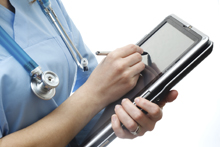
The use of mobile devices in hospitals and doctor’s offices has become common place, as physicians do everything from taking electronic notes during patient visits, to accessing test results and diagnostics on their mobile phones and tablet computers.
While the technology works wonders for information sharing and time saving, accessing electronic health records using a mobile device can pose serious information security risks to patients. There are currently more than 10,000 mobile healthcare iPad apps available, including a large number of which that allow physicians to access electronic heath records.
Between late September 2009 and early May 2011, there were reportedly 116 data breaches of 500 or more records, as a direct result of mobile devices being lost or stolen. In these instances, the confidential health records of more than 1.9 million patients were exposed.In some cases digital information and health records can be more secure than paper files, however this only applies if proper security measures and risk assessments are in place.
“Organizations need to understand the complexities of securing mobile devices, applications and the people who use them as part of a well-rounded data security and risk management program,” explains Chad Boeckmann, president of Secure Digital Solutions.
Protected health information is also often left open to hackers, as many clinics and hospitals don’t have secure Wi-Fi networks.

